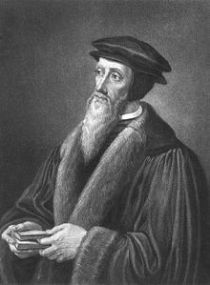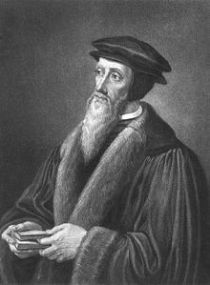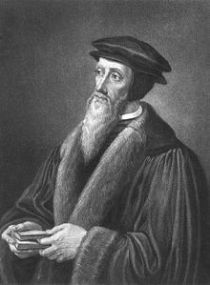
“It is necessary to attend to what I lately said, that our faith in doctrine is not established until we have a perfect conviction that God is its author. Hence, the highest proof of Scripture is uniformly taken from the character of him whose Word it is. The prophets and apostles boast not their own acuteness or any qualities which win credit to speakers, nor do they dwell on reasons; but they appeal to the sacred name of God, in order that the whole world may be compelled to submission. The next thing to be considered is, how it appears not probable merely, but certain, that the name of God is neither rashly nor cunningly pretended. If, then, we would consult most effectually for our consciences, and save them from being driven about in a whirl of uncertainty, from wavering, and even stumbling at the smallest obstacle, our conviction of the truth of Scripture must be derived from a higher source than human conjectures, Judgments, or reasons; namely, the secret testimony of the Spirit. It is true, indeed, that if we choose to proceed in the way of arguments it is easy to establish, by evidence of various kinds, that if there is a God in heaven, the Law, the Prophecies, and the Gospel, proceeded from him. Nay, although learned men, and men of the greatest talent, should take the opposite side, summoning and ostentatiously displaying all the powers of their genius in the discussion; if they are not possessed of shameless effrontery, they will be compelled to confess that the Scripture exhibits clear evidence of its being spoken by God, and, consequently, of its containing his heavenly doctrine. We shall see a little farther on, that the volume of sacred Scripture very far surpasses all other writings. Nay, if we look at it with clear eyes, and unblessed judgment, it will forthwith present itself with a divine majesty which will subdue our presumptuous opposition, and force us to do it homage.
Still, however, it is preposterous to attempt, by discussion, to rear up a full faith in Scripture. True, were I called to contend with the craftiest despisers of God, I trust, though I am not possessed of the highest ability or eloquence, I should not find it difficult to stop their obstreperous mouths; I could, without much ado, put down the boastings which they mutter in corners, were anything to be gained by refuting their cavils. But although we may maintain the sacred Word of God against gainsayers, it does not follow that we shall forthwith implant the certainty which faith requires in their hearts. Profane men think that religion rests only on opinion, and, therefore, that they may not believe foolishly, or on slight grounds, desire and insist to have it proved by reason that Moses and the prophets were divinely inspired. But I answer, that the testimony of the Spirit is superior to reason. For as God alone can properly bear witness to his own words, so these words will not obtain full credit in the hearts of men, until they are sealed by the inward testimony of the Spirit. The same Spirit, therefore, who spoke by the mouth of the prophets, must penetrate our hearts, in order to convince us that they faithfully delivered the message with which they were divinely entrusted. This connection is most aptly expressed by Isaiah in these words, ‘My Spirit that is upon thee, and my words which I have put in thy mouth, shall not depart out of thy mouth, nor out of the mouth of thy seed, nor out of the mouth of thy seed’s seed, saith the Lord, from henceforth and for ever,’ (Isa. 59:21). Some worthy persons feel disconcerted, because, while the wicked murmur with impunity at the Word of God, they have not a clear proof at hand to silence them, forgetting that the Spirit is called an earnest and seal to confirm the faith of the godly, for this very reason, that, until he enlightens their minds, they are tossed to and fro in a sea of doubts.
Let it therefore be held as fixed, that those who are inwardly taught by the Holy Spirit acquiesce implicitly in Scripture; that Scripture, carrying its own evidence along with it, deigns not to submit to proofs and arguments, but owes the full conviction with which we ought to receive it to the testimony of the Spirit. [The French adds, ‘Car jacoit qu’en sa propre majesté elle ait assez de quoy estre reuerée, neantmoins elle commence lors à nous vrayement toucher, quand elle est scellée en nos coueurs par le Sainct Esprit.”—For though in its own majesty it has enough to command reverence, nevertheless, it then begins truly to touch us when it is sealed in our hearts by the Holy Spirit.] Enlightened by him, we no longer believe, either on our own Judgment or that of others, that the Scriptures are from God; but, in a way superior to human judgment, feel perfectly assured—as much so as if we beheld the divine image visibly impressed on it—that it came to us, by the instrumentality of men, from the very mouth of God. We ask not for proofs or probabilities on which to rest our judgment, but we subject our intellect and judgment to it as too transcendent for us to estimate. This, however, we do, not in the manner in which some are wont to fasten on an unknown object, which, as soon as known, displeases, but because we have a thorough conviction that, in holding it, we hold unassailable truth; not like miserable men, whose minds are enslaved by superstition, but because we feel a divine energy living and breathing in it—an energy by which we are drawn and animated to obey it, willingly indeed, and knowingly, but more vividly and effectually than could be done by human will or knowledge. Hence, God most justly exclaims by the mouth of Isaiah, ‘Ye are my witnesses, saith the Lord, and my servant whom I have chosen, that ye may know and believe me, and understand that I am he,’ (Isa. 43:10).
Such, then, is a conviction which asks not for reasons; such, a knowledge which accords with the highest reason, namely knowledge in which the mind rests more firmly and securely than in any reasons; such in fine, the conviction which revelation from heaven alone can produce. I say nothing more than every believer experiences in himself, though my words fall far short of the reality. I do not dwell on this subject at present, because we will return to it again: only let us now understand that the only true faith is that which the Spirit of God seals on our hearts. Nay, the modest and teachable reader will find a sufficient reason in the promise contained in Isaiah, that all the children of the renovated Church ‘shall be taught of the Lord,’ (Isaiah 54:13). This singular privilege God bestows on his elect only, whom he separates from the rest of mankind. For what is the beginning of true doctrine but prompt alacrity to hear the Word of God? And God, by the mouth of Moses, thus demands to be heard: ‘It is not in heavens that thou shouldest say, Who shall go up for us to heaven, and bring it unto us, that we may hear and do it? But the word is very nigh unto thee, in thy mouth and in thy heart,’ (Deut. 30:12, 14). God having been pleased to reserve the treasure of intelligence for his children, no wonder that so much ignorance and stupidity is seen in the generality of mankind. In the generality, I include even those specially chosen, until they are ingrafted into the body of the Church. Isaiah, moreover, while reminding us that the prophetical doctrine would prove incredible not only to strangers, but also to the Jews, who were desirous to be thought of the household of God, subjoins the reason, when he asks, ‘To whom has the arm of the Lord been revealed?’ (Isaiah 53:1). If at any time, then we are troubled at the small number of those who believe, let us, on the other hand, call to mind, that none comprehend the mysteries of God save those to whom it is given.”
– John Calvin (1509-1564), Institutes of the Christian Religion, I.vii.4, 5










